

My EuroBSDCon Experience in Dublin
Before the Conference
The idea of taking part in EuroBSDCon first came to mind in 2023. Coimbra would have been a great location for returning to a conference after many years, but unfortunately I couldn’t make it. When the call for registration in Dublin approached, I decided that would be the right occasion. In the meantime, the BSD Cafe project had been launched, and the welcoming enthusiasm it received provided a strong push. I thought I might propose a talk. My work involves BSD systems daily with a variety of clients, and sharing how I’ve managed (and still manage) the transition from Linux to the BSDs might interest the community.
I still remember that moment in June when I clicked “Submit”. I told my wife, “Whether as a speaker or as a participant, in September we’re going to Dublin.” She works with me, so she would also attend the conference. It was one of the best ideas in recent years.
I still recall when, on my way to the office, I glanced at my smartwatch notification: my talk had been accepted. In an instant, I felt two distinct, intense emotions: enthusiasm and terror. I have no issues with public speaking, but doing it again in English at such an event… In reality, that fear was unfounded, as I would only discover two months later.
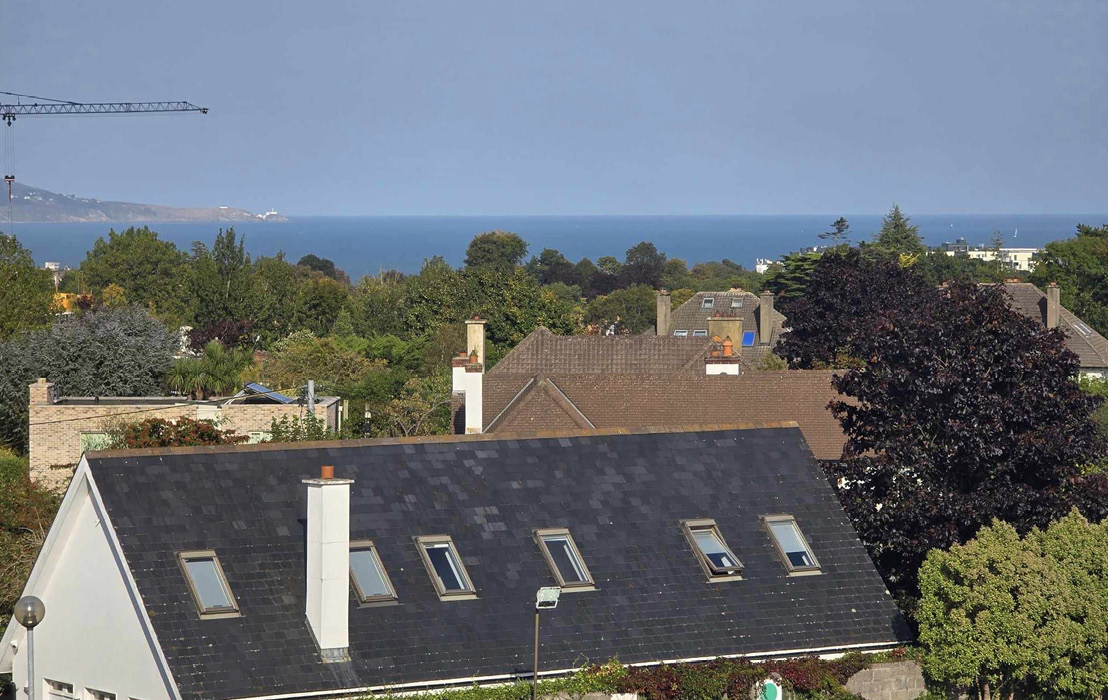 As the event drew closer, the organizers provided all the necessary information. They were extremely patient, even when I asked seemingly trivial questions. It was my first EuroBSDCon, and the “BSD” at the center of the name should have taught me something every BSD user knows: everything is documented in the finest detail. The FAQs were frequently updated. It’s a known feature: BSD-related documentation is always impeccable.
As the event drew closer, the organizers provided all the necessary information. They were extremely patient, even when I asked seemingly trivial questions. It was my first EuroBSDCon, and the “BSD” at the center of the name should have taught me something every BSD user knows: everything is documented in the finest detail. The FAQs were frequently updated. It’s a known feature: BSD-related documentation is always impeccable.
We left on Thursday, as we wouldn’t be attending the tutorials. It was my first time in Ireland, my first BSD Conference, and my first time as a speaker. Upon arrival, everything was perfectly organized: directions for transportation, accommodation at the speakers’ hotel with a splendid view of the Irish Sea. The organizers know how to pamper their speakers.
That evening we went down to dinner and I was nervous, being terrible at recognizing faces. I was sure I would run into someone I had known online for a long time but wouldn’t recognize.
The Day Before the Talks
Friday morning was dedicated to reviewing my notes and slides. Each presentation had a 45-minute slot, including questions, and I was pretty sure I’d go slightly over. In my test runs, I managed to stay under 50 minutes, though not under 45. The advantage of having the last talk before the Social Event is that a small time overrun wouldn’t affect other speakers, and I could “postpone” questions to the Social Event. In any case, I was satisfied with the result. I didn’t yet know how the audience would receive my talk, but the community’s warmth and flawless organization already made me feel part of something special.
In the morning, I received an email from Philipp Buehler suggesting a quick trip to the venue in the afternoon to test the projectors. The goal was to avoid any last-minute technical issues before my talk that would waste precious time. So, after lunch, we took a pleasant stroll through Dublin, heading to the conference venue.
The Venue and Early Impressions
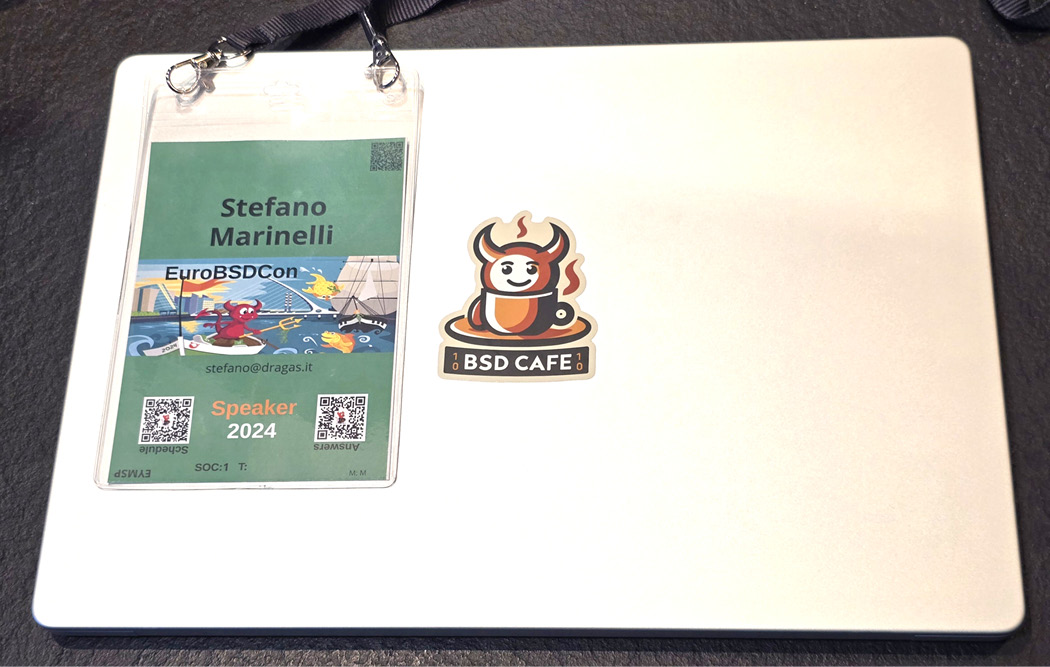 EuroBSDCon was held at University College Dublin (UCD), in the O’Reilly Hall — a location I found extremely fitting and comfortable. At the entrance there were two areas: on the right, check-in and registration (with badges in three colors: orange for organizers and staff, white for participants, and green for speakers); on the left, a zone with t-shirts and more staff and friends. On arrival, as soon as I introduced myself, the welcome was warm and friendly. Henning Brauer handed us our badges — seeing that green badge filled me with pride. With him was Katie McMillan, whom I had never interacted with even online, but I had seen her presentation video from BSDCan, so it was a real pleasure to meet her. At the other table were several people, including Mischa Peters (who gave me an OpenBSD.Amsterdam t-shirt), my “colleague” Jeroen Janssen (aka h3artbl33d, one of the admins of the Mastodon instance exquisite.social), Peter Hansteen, Paul de Weerd, René Ladan, Janne Johansson, Guido Van Rooij, Michael Reim, Benny Siegert, and others. People I’ve respected for years, all gathered there. We talked for over an hour, with others joining and leaving as time passed. I already knew the BSD community was positive, but I was surprised at how cohesive the various groups were. I immediately felt at ease, that sensation you get when you’re in a familiar place among dear friends.
EuroBSDCon was held at University College Dublin (UCD), in the O’Reilly Hall — a location I found extremely fitting and comfortable. At the entrance there were two areas: on the right, check-in and registration (with badges in three colors: orange for organizers and staff, white for participants, and green for speakers); on the left, a zone with t-shirts and more staff and friends. On arrival, as soon as I introduced myself, the welcome was warm and friendly. Henning Brauer handed us our badges — seeing that green badge filled me with pride. With him was Katie McMillan, whom I had never interacted with even online, but I had seen her presentation video from BSDCan, so it was a real pleasure to meet her. At the other table were several people, including Mischa Peters (who gave me an OpenBSD.Amsterdam t-shirt), my “colleague” Jeroen Janssen (aka h3artbl33d, one of the admins of the Mastodon instance exquisite.social), Peter Hansteen, Paul de Weerd, René Ladan, Janne Johansson, Guido Van Rooij, Michael Reim, Benny Siegert, and others. People I’ve respected for years, all gathered there. We talked for over an hour, with others joining and leaving as time passed. I already knew the BSD community was positive, but I was surprised at how cohesive the various groups were. I immediately felt at ease, that sensation you get when you’re in a familiar place among dear friends.
At a certain point, Franco Fichtner arrived to do the same technical check. OPNSense is one of my first choices for router/firewall solutions for clients, and chatting with him directly was a real pleasure.
When the tutorials resumed, participants went back to their sessions. We returned to the hotel for a bit of relaxation and another review of my talk, as well as to write the “I Solve Problems” blog post I would publish once back home.
Saturday: The Conference in Full Swing
Saturday morning, 9:30: registration and participants arriving. I was positively anxious, looking at everyone’s badges to read names and try to identify and remember! Right in the entrance hall, I started meeting people: Vanja, Toni, and Natalino approached and we introduced ourselves, talking a bit about our roles. Among the buzz, I appreciated being able to speak some Italian. Alfonso Siciliano also arrived, and we talked quite a lot. Alfonso is pleasant, friendly, and extremely competent and serious, with the same qualities I recognized in Leonardo Taccari (from the NetBSD team).
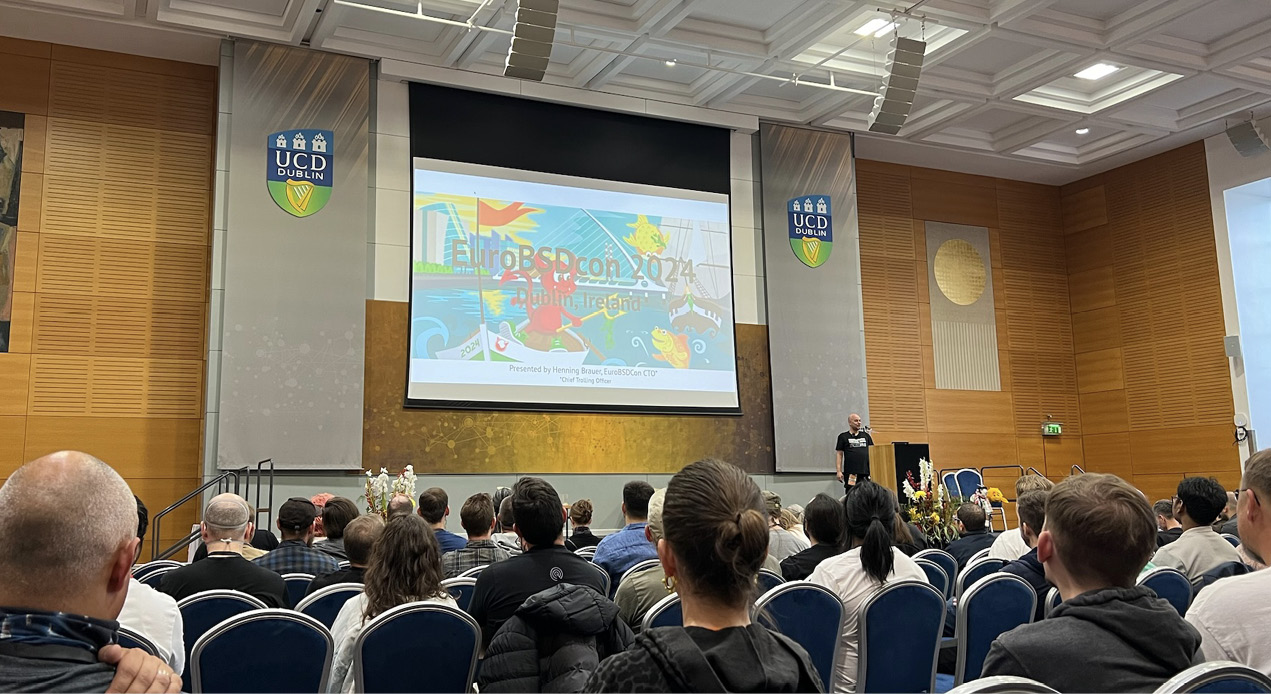 I took a walk around to see how everything was arranged. There were three conference rooms (Foyer A, Foyer B, and Stage End) and a wonderful, bright, spacious hall overlooking the UCD lake. This hall offered tea, coffee, and water. There was a table where people had left stickers and other swag — I had brought many BSD Cafe stickers and coasters, which I distributed personally and left on that table, and they seemed appreciated. There were also sponsor tables and, at the center, a table reserved for the FreeBSD Foundation. I was delighted to meet Deb Goodkin and Kim McMahon in person — talking with them was a real pleasure. Hearing about the Foundation’s ideas and projects directly from them was fantastic.
I took a walk around to see how everything was arranged. There were three conference rooms (Foyer A, Foyer B, and Stage End) and a wonderful, bright, spacious hall overlooking the UCD lake. This hall offered tea, coffee, and water. There was a table where people had left stickers and other swag — I had brought many BSD Cafe stickers and coasters, which I distributed personally and left on that table, and they seemed appreciated. There were also sponsor tables and, at the center, a table reserved for the FreeBSD Foundation. I was delighted to meet Deb Goodkin and Kim McMahon in person — talking with them was a real pleasure. Hearing about the Foundation’s ideas and projects directly from them was fantastic.
Meanwhile, the technical team was fine-tuning the last details — including the whims of a Decimator device — promptly handled by Michael Dexter, who swiftly hooked up his laptop and replaced its firmware. The wonders of being among highly competent professionals!
At 10:30, everyone moved to the Stage End room for the Opening Session, where everyone greeted each other, the program was presented, and some useful information was provided. At 11:00, Tom Smyth presented the Keynote: Evidence based Policy formation in the EU what Evidence are we Presenting to the EU?
Tom, positively emotional, presented with passion, competence, and pride. His message and information were comprehensive and valuable, and I believe everyone appreciated his talk. At the end, after well-deserved applause, the gift for the speakers was handed out: a marvelous green merino wool scarf with an inscription in Ogham. Choosing which talks to attend was the hardest part. They were all interesting, but the three tracks ran in parallel, forcing tough decisions. Fortunately, I knew the presentation videos would be available later.
I attended Franco Fichtner’s talk: Tooling Around With FreeBSD — A tale of scripting a custom firewall distribution. This was very interesting for someone like me who often uses OPNSense. Understanding some of their design decisions was enlightening, as it helped me grasp the project’s direction.
Meeting People and Sharing Experiences
One of the people I had the opportunity to meet — whom I already knew online through social interactions and his role in the BSD Now podcast — is Jason Tubnor. Jason is friendly and upbeat, and he asked if he could do a brief interview about the event, me, BSD Cafe, and my talk. I gladly accepted, and we did it during the lunch break. There was a fully equipped room upstairs, perfectly set up for the purpose. BSD-style organization — always efficient.
During the lunch break, I also got to meet and chat with Benedict Reuschling. I’m very grateful to Benedict (and Jason and the other presenters) for the BSD Now podcast and for introducing me to Jim Maurer about a year ago, enabling me to write my first article for the FreeBSD Journal. Still in the Foundation’s sphere, I had a pleasant conversation with Ed Maste. Truthfully, I’m a somewhat shy person, and I felt like I might be “bothering” people by just approaching them. For instance, I didn’t get to speak with Colin Percival, Allan Jude, Dan Langille, and others — including the great Jon “Maddog” Hall. I’ll catch up next time!
Lunch was served in the hall. There were small portions of various dishes being handed out. There were also tables with different kinds of sweets, all very good. During the break, it was possible to meet and chat with many people — too many to list. I fear I’d forget some, and that would be a pity, because everyone attending the event is, in some way, linked to the IT, Open Source, and BSD world — people I’d love to talk with for hours, not just minutes.
After lunch, I chose to attend Nicola Mingotti’s talk: An introduction to GPIO in RPi3B+ and NetBSD, building a wind-speed logger as an application. I’d already spoken with Nicola before the event, and the NetBSD + Raspberry Pi combo is something I also frequently use. Nicola presented one of his setups, the issues he faced, and how this solution effectively solves his problems.
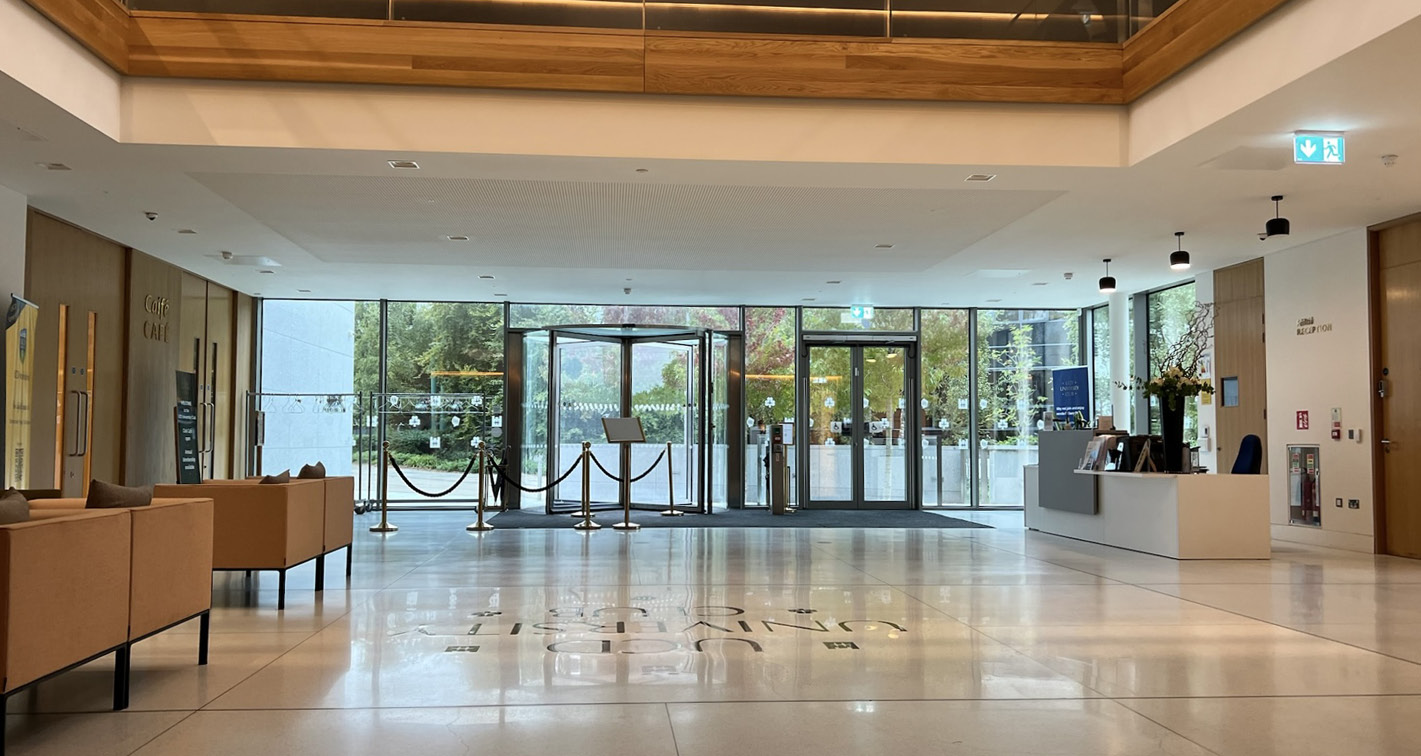 The next three talks all covered topics of immense interest to me. Unable to decide, I used that slot to review my own talk, settling into a very comfortable lounge area in the UCD building. Soft couches allowed me to focus. My greatest fear was skipping a part or forgetting something important. While I was there, I met Dave Cottlehuber, and we talked a bit about various things, including email system management. Meeting Dave confirmed the impression I had formed of him online: a pleasant and friendly person, as well as extremely knowledgeable.
The next three talks all covered topics of immense interest to me. Unable to decide, I used that slot to review my own talk, settling into a very comfortable lounge area in the UCD building. Soft couches allowed me to focus. My greatest fear was skipping a part or forgetting something important. While I was there, I met Dave Cottlehuber, and we talked a bit about various things, including email system management. Meeting Dave confirmed the impression I had formed of him online: a pleasant and friendly person, as well as extremely knowledgeable.
The following talk I attended was by Kim McMahon: How You Can Advocate for FreeBSD — And How We Can Help. I was very interested in this, and Kim delivered it brilliantly at the Stage End room. I try to advocate only for solutions I use and trust, without any barriers. Today, FreeBSD can tackle the vast majority of challenges I and my clients face, effectively and efficiently. But I’m not a trained communicator, so getting advice from a professional like Kim was helpful.
The next talk choice was easy: Foyer A, Walter Belgers: Hacking — 30 years ago. I chose it both for my interest in the topic (I love real-life experiences) and because my talk would be next in that same room. Also, I knew this talk wouldn’t be recorded, so this was a unique chance to see it live. Walter shared fascinating anecdotes and stories in an ironic and engaging way. A different era, a different type of computing, a completely different notion of security compared to today. Yet some things never change, providing a sense of continuity over time.
My Talk
The moment had come to get up and move towards the speaker’s station. Suddenly, adrenaline surged — and then receded. Some people left the room, others entered. I was busy connecting my laptop and barely noticed what was happening around me, except that — much to my pleasure and honor — Professor Marshall Kirk McKusick stayed to listen to my presentation. He’s another person I didn’t have the “courage” to approach this time, but I will next time.
Patrick McEvoy, efficient and professional as always, helped me put on the microphone, took his position, and nodded. Everything worked perfectly.
People sat down, Henning introduced me. The stage was mine. It was time to tell my story: how nearly 30 years ago, a CD-ROM set of Linux distributions, and how, over 22 years ago, meeting a teacher (Özalp Babaoğlu — one of the fathers of original BSD), buying a laser printer (convincing my parents it was for “university purposes”), and printing out the FreeBSD Handbook all led me to where I am now. Thanks to a teacher, a printer, and a passion, here I am among friends, and these friends are here to listen to my story. I instantly became calm. I started timidly, but my shyness lasted only a few minutes.
“I’m Stefano Marinelli. I Solve Problems.” I saw smiles. The reference was understood. No doubt about that.
As I continued speaking, I saw the audience’s attention grow. Over the years, interest in BSDs had somewhat waned. Many big companies, after ignoring open source solutions for years, began embracing Linux and its ecosystem. While this gave a significant boost to open source in general, it indirectly reduced the adoption of other operating systems like FreeBSD. Sometimes the reason is corporate politics, know-how (“it’s easier to find people experienced in Linux”), or purely ideological or commercial motives (“Everyone knows what Linux is, so it sells better”). But I am doing the exact opposite. I don’t disdain Linux, but I prefer the BSDs. And people wanted to know how that was going.
At one point, as I mentioned my blog post about a NetBSD server running unattended for over 10 years, I saw a guy in the front row open his eyes wide: “I can’t believe it! You’re that guy!” A wonderful moment: he had been following my blog for a long time and had attended my talk without realizing I was the same person. After the talk, we spoke for a while, and he said some very kind things. I greatly appreciated it. Thank you, Raymundo Soto!
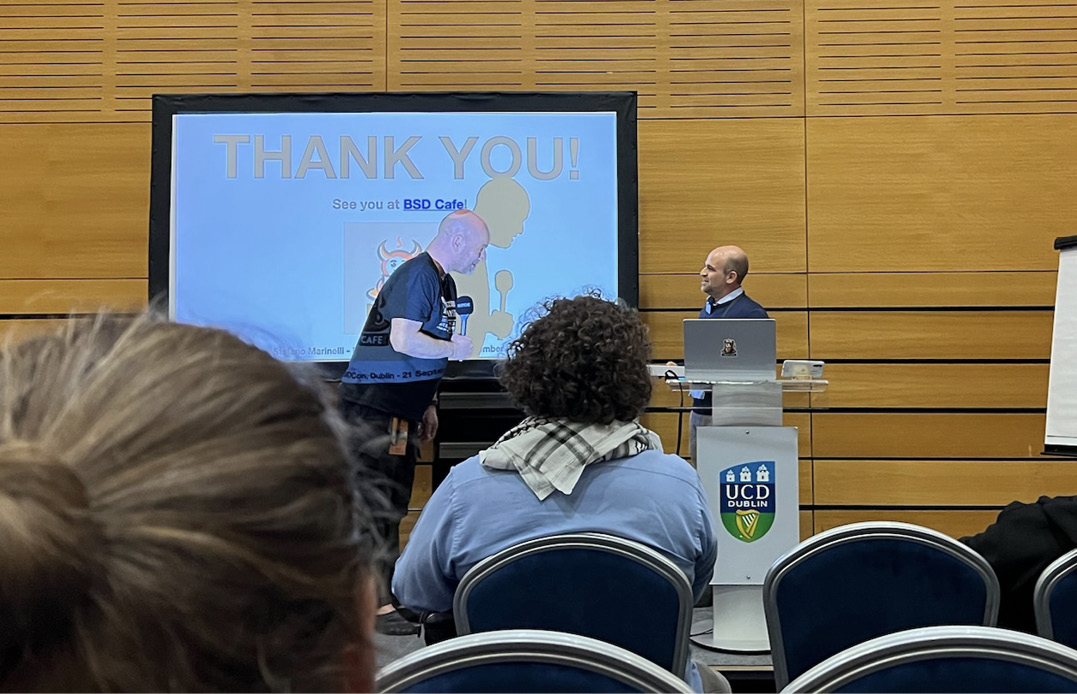 the end of my presentation (I exceeded the time limit by just a bit), Henning gave me the speaker’s scarf and suggested postponing questions to the Social Event. Still, a few people approached immediately, and I was happy to chat and answer questions. If these people dedicated an hour of their time to listen to me, the least I could do was listen to their ideas, experiences, and opinions.
the end of my presentation (I exceeded the time limit by just a bit), Henning gave me the speaker’s scarf and suggested postponing questions to the Social Event. Still, a few people approached immediately, and I was happy to chat and answer questions. If these people dedicated an hour of their time to listen to me, the least I could do was listen to their ideas, experiences, and opinions.
As I was leaving, I met Max Stucchi and Salvatore Cuzzilla. After a handshake, Max confirmed that the GUFI (Gruppo Utenti FreeBSD Italia) is still alive and invited me to join, which I did with great pleasure.
The Social Event
We then headed to the bus stop that would take us to the Social Event, held at the BrewDog, a very distinctive building in the Docklands area, overlooking the River Liffey. The bus was significantly late, so we waited outside for a while. I was still relieved and happy about how my talk had been received, so that wait was pleasant. We chatted with others, and finally the bus arrived. We hopped on the upper deck and traveled about 25 minutes to our destination.
We made our way through the characteristic Docks to reach the pub. After scanning our badges, we were given three drink tickets. After the positive tension of the talk, it felt great to relax, chatting with colleagues, enjoying good food and good beer, experiencing a real Saturday night out in Dublin. Masanobu Saitoh, who had come all the way from Japan to attend the conference, came by my table to express his appreciation. It meant a lot to me, and one of his photos is among the best taken of me at the event.
Around 22:30, we decided to head back to the hotel and called a taxi. On the way down, we met Robert Clausecker, who was going the same way, and decided to return together.
My mood was sky-high. I saw how my wife looked at me, happy to see me so calm and positive, already thinking about the next day.
Sunday: Wrapping Up
On Sunday morning, the event started half an hour later. Surprise upon waking: I was almost voiceless. Talking so much over the last few days, plus the Dublin climate — so different from Italy’s — probably played equal parts. This further prevented me from interacting with many people I would have liked to meet.
Sunday’s keynote was presented by Kent Inge Fagerland Simonsen: Is our software sustainable? I was very, very interested in this topic since I’m quite sensitive to the concept of sustainability in IT. I am convinced that optimization (both hardware and software) is crucial, especially in the medium/long term. There’s no point in making hardware more energy-efficient and powerful if we bloat the software so much that it negates or even worsens the overall situation.
Unfortunately, I couldn’t attend, because system administrators don’t have fixed working hours. That night, two physical servers decided to fail simultaneously. Since these were important servers and Sunday was another conference day, I preferred to fix them before leaving the hotel, arriving at the conference a bit later. Nothing that a zfs-send, zfs-receive, and a DNS update couldn’t handle. I waited for the data to transfer and ensured everything was fine. Users never noticed a thing, which made the effort worthwhile. FreeBSD, bhyve, and jails once again helped minimize problems and downtime.
More Talks and the Family Photo
For the next talk, it was tough to choose — they were all very interesting. I ended up at Alexander Bluhm’s presentation: A Packet’s Journey Through the OpenBSD Network Stack. It was very interesting. Alexander showed, step by step, the path of packets and explained the decisions made along the way. There were many questions and answers, making it even more engaging. At the exit, I met Sven Ruediger, who had just presented his work. We exchanged a few words. I’m sorry I missed his talk, as I heard very positive comments about it.
After lunch, everyone gathered for the traditional family photo. In just a few minutes, we assembled outside the UCD hall — with the lake behind the photographer — and took the shot. Over 200 people were quickly lined up in an organized manner. Even here, the BSD community’s efficiency was evident. It was a joyful, positive moment. The term “family” photo, rather than “group” photo, perfectly conveys the atmosphere.
Then it was time for another challenging choice: Kirk McKusick, David Brooks, or Jason Tubnor. I chose Jason’s talk: Building a SD-WAN appliance suitable for an Australian Health Sector NFP/NGO. Jason has a similar approach to mine, detailing interesting reasons and issues he faced while building his infrastructure. I also like to solve problems using technologies, not just “boxes,” so I really enjoyed his presentation.
Next, I chose Michael Dexter’s talk: FreeBSD and Windows Environments. Michael is constantly involved with OpenZFS, jails and bhyve — three essential tools in my work — and his presentation was, as usual, brilliant, informative, and extremely inspiring. He gave me another reason to migrate some Windows servers from Linux/KVM to bhyve, and the results have been excellent. At the end of Michael’s presentation, Patrick McEvoy came up to tell me he greatly enjoyed my talk. That meant a lot to me. Patrick is someone I highly respect, and his opinion matters to me.
Unfortunately, luck is blind, but misfortune sees all too well. While I was getting ready for Dan Langille’s talk, Doing stupid things with FreeBSD jails, I received a flurry of server alerts and had to rush out to solve them. Fortunately, the wifi connection was excellent, and I managed to intervene, but I missed the talk. I was free again midway through the next session, and it didn’t feel right to enter halfway. So, I used the time to talk to Deb and Kim about my advocacy ideas. People often don’t know what FreeBSD can do for them. That’s why I try to show, by sharing my story and blog articles, that BSDs are not “untamable beasts” but our friends.
The Closing Session
At the end, everyone gathered at Stage End for the closing session. I learned about some traditions (like the FreeBSD Foundation raffle — how did Vanja get that Lego guitar home, given its size?) and the auction of “lost” items. The money went to https://www.womensaid.ie/.
The closing session was fun and informative. There were thanks to all sponsors and friends of the event, a link to download the Family Photo was provided, and we heard about the next events like AsiaBSDCon and BSDCan. Then came the much-anticipated moment: the announcement of the next EuroBSDCon location. I hoped it would be reasonably convenient, since it was now clear that EuroBSDCon would be a must-attend event for me. And… Zagreb!. Just a few hours’ drive from home, so I must attend. Mischa made me promise that, since I can go by car, I’ll bring more BSD Cafe gadgets. I will.
Finally, there were goodbyes. It was a heartfelt farewell, with promises to meet again soon. I thanked and congratulated everyone I could, praising the technical, organizational, and content quality of the event. I received the same warmth and affection from all. But…
…I still had one last sticker in my pocket. Just one, because a BSD Cafe user (Kaveman) had told me he would attend the conference, but we hadn’t met yet. Right at the end, just before leaving, we found each other. It was a pleasure to give him the sticker I had saved for two days, just for him.
Final Thoughts
Even Liam Proven (whom I didn’t speak to during the event) attended, and a few weeks later, he wrote an article about it and my talk on The Register — an article that I really appreciated.
After meeting all these people and attending the talks, I realized that the BSDs are more alive than ever, that development is ongoing, and that the FreeBSD Foundation and the developers have very clear plans on how to move forward, what is needed, and how to proceed to make it happen. It was a conference that greatly enriched both me and the other attendees, because it was led by people who work daily WITH the systems being discussed. Little commercial hype, a lot of real technical content. So much substance. Tremendous human and technological value.
EuroBSDCon was a memorable event for me. I doubt I can fully express in words all the emotions and positivity it conveyed. The BSD community is inclusive, open, and collaborative, and the event showcased this spirit in every participant. Collaboration, not competition. The BSD community sometimes stays quiet because it’s focused on creating rather than “selling.” In my view, this is a huge advantage and a strong point.
Janne Johansson summarized my feelings perfectly on IRC:
“If you saw a short guy smiling ALL THE TIME it was Stefano Marinelli. He seemed super happy to be there every time I saw him (which is the correct way to feel on EuroBSDCons ;))”
